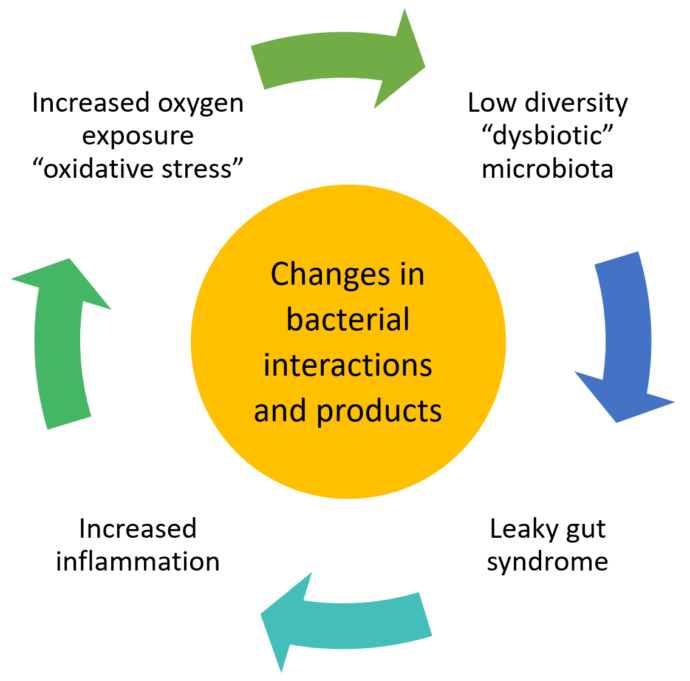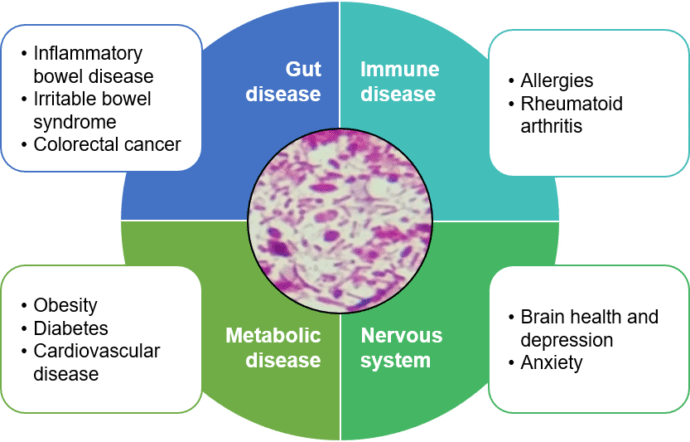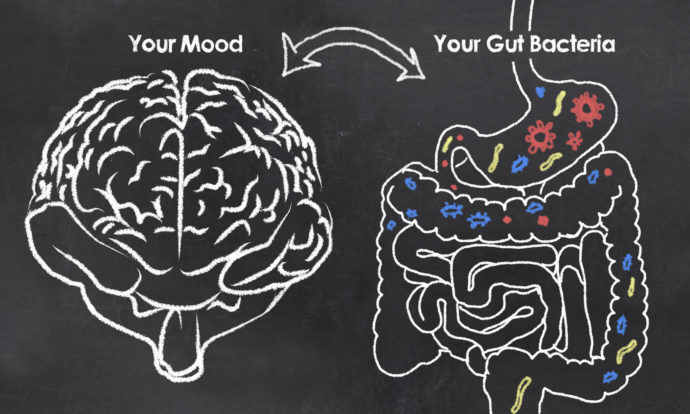The gut microbiota has a number of different important roles in maintaining health. They metabolise dietary components, producing essential metabolites which are important in keeping us healthy. They help in the development of a healthy immune system (known as immune priming). They are also involved in communication between your gut and your brain through a signalling system called the gut-brain axis. This is linked with conditions such as depression and anxiety. A healthy microbiota is also helpful in defence against harmful microbes, known as pathogens. They do this by competing for nutrients and space, maintaining barrier function of the gut wall and pH inhibition. They can also modify substances that the host produces such as bile and mucin (a protein that is found in mucus).

We understand more and more about the links between diet, microbes and health. Gut microbes, or the products that they create, have now been linked to a wide range of human diseases – not just gut diseases. The microbes may not always CAUSE the disease, but we know that people with those diseases have different microbial composition – a disturbed or dysbiosis in the microbiota – compared to healthy people
In many cases the disturbed microbiota is less diverse – meaning that it contains a smaller number of different bacterial groups. This less diverse microbiota produces different compounds (less protective and more harmful metabolites) that can damage the layer of cells lining the gut (causing a leaky gut). The resulting thinner protective layer between the bacteria in the gut and the cells lining the gut means that there is more interaction between bacteria and the immune system that can cause gut inflammation and also increases the amount of oxygen the gut bacteria are exposed to. This in turn affects the microbial composition even more and a vicious circle effect is created.
Gut Disease
Any alterations in the presence of different groups of bacteria can affect the development of gut diseases. This can be a consequence of increases in the numbers of bacteria that produce damaging metabolic products or a decrease in bacterial populations that produce protective compounds. Increased gut inflammation (as described above) can itself lead to disease due to the increased activity of the gut immune system.


Immune disease
We know that the order and establishment of the early microbiota from infancy is important for the proper development of the immune system. People who have different microbial compositions in infancy are more likely to develop allergic diseases like asthma and eczema when they are older, even if their microbial composition is by then the same as their peers. There is also evidence that people with rheumatoid arthritis, an autoimmune disease affecting the joints, have a different microbial composition to other people of the same age.
Brain
The gut-brain axis is the newest interaction that has been discovered, linking the activity of the gut microbiota with brain health. The metabolic products of some bacteria circulate round the body in the bloodstream, directly interacting with specific receptors at different sites in the human body, while others trigger production of different anti-inflammatory or pro-inflammatory molecules by the immune system. Both of these routes can have an impact on mood, behaviour and brain function.


Metabolic disease
Obese people often have a less diverse microbiota than those of a healthy weight. Although any difference in their diet could be affecting the microbiota, we know that the less diverse microbiota can cause gut inflammation and affect the microbial composition even more. Gut bacteria can have a direct effect on the development of cardiovascular disease. One group of gut bacteria convert dietary choline into a compound called trimethylamine (TMA). TMA is transferred from the gut to the liver where it is metabolised by human enzymes into trimethylamine oxide (TMAO), and increased concentrations of TMAO have been found in people with atherosclerosis (a type of heart disease). If you eat lots of foods that contain choline (meat and eggs), and if you also contain the groups of bacteria that make TMA from dietary choline, you could be more susceptible to developing heart disease.
Read also
Gut health
Your diet and your microbes
Because the microbes in your gut get their nutrition from the food that we eat, it is important to promote growth of the “good” bacteria by eating a healthy diet.
